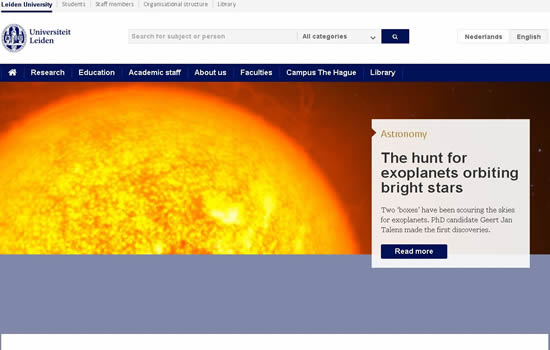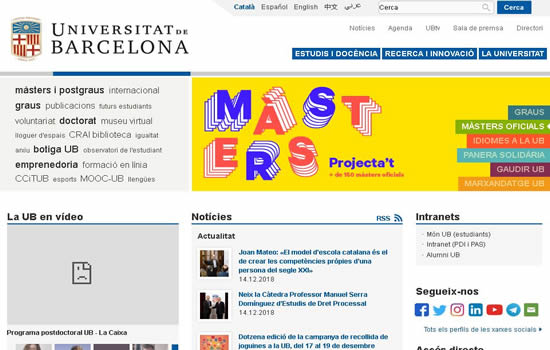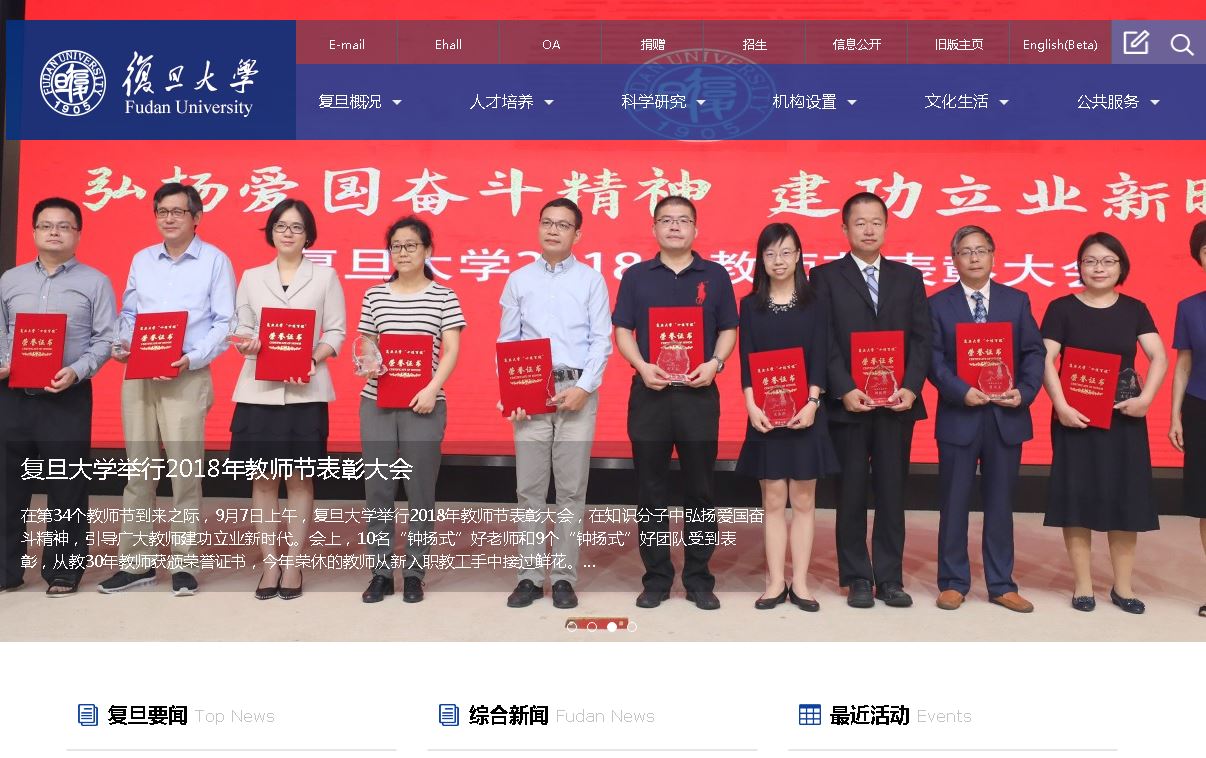选择热点
 荷兰莱顿大学
荷兰莱顿大学 西班牙巴塞罗那大学
西班牙巴塞罗那大学 巴西圣保罗大学 University of Sao Paulo, Brazil
巴西圣保罗大学 University of Sao Paulo, Brazil 台湾南华大学 University of South China in Taiwan
台湾南华大学 University of South China in Taiwan 科技大学 National University of Defense Technology
科技大学 National University of Defense Technology 南京大学 Nanjing University
南京大学 Nanjing University 上海复旦大学 Fudan University
上海复旦大学 Fudan University 泗水大学(Ubaya)
泗水大学(Ubaya) 印尼大学 universitas indonesia
印尼大学 universitas indonesia 越南某大学 Vietnam National University
越南某大学 Vietnam National University 菲律宾大学 University Of The Philippines
菲律宾大学 University Of The Philippines
双语诗歌翻译|中庸·三十三
发布时间:2025-01-06
来源:大学网站
中庸 是中国儒家经典之一,原是 礼记 第三十一篇,相传为战国时期孔伋(子思)所作。
其内容肯定“中庸”是道德行为的最高标准,把“诚”看成是世界的本体,认为“至诚”则达到人生的最高境界,并提出“博学之,审问之,慎思之,明辨之,笃行之”的学习过程和认识方法。
宋代从 礼记 中抽出,与 大学 论语 孟子 合为“四书”。
宋元以后,成为学校官定的教科书和科举考试的必读书,对中国古代教育产生了极大的影响。
中庸三十三诗曰:“衣锦尚絅。
”恶其文之著也。
故君子之道,暗然而日章;小人之道,的然而日亡。
君子之道,淡而不厌,简而文,温而理;知远之近,知风之自,知微之显,可与入德矣。
诗云:“潜虽伏矣,亦孔之昭。
”故君子内省不疚,无恶于志。
君子之所不可及者,其唯人之所不见乎!
诗云:“相在尔室,尚不愧于屋漏。
”故君子不动而敬,不言而信。
诗曰:“奏假无言,时靡有争。
”是故君子不赏而民劝,不怒而民威于鈇钺。
诗曰:“不显惟德!
百辟其刑之。
”是故君子笃恭而天下平。
诗云:“予怀明德,不大声以色。
”子曰:“声色之于以化民,末也。
”诗曰:“德輶如毛。
”毛犹有伦。
“上天之载,无声无臭。
”至矣。
XXXIIIIn the Book of Songs it is said:“Over her brocaded robe.
”She wore a plain and simple dress, --in that way showing her dislike of the loudness of its colour and magnificence.
Thus the life of the moral man is unobtrusive and yet it grows more and more in significance; whereas the life of the vulgar person is ostentatious but it loses more and more in significance until it becomes nothingness.
The life of the moral man is plain and yet not unattractive; it is simple and yet full of grace; it is easy and yet methodical.
He knows that accomplishment of great things consists in doing little things well.
He knows that great effects are produced by small causes.
He knows the evidence and reality of what cannot be perceived by the senses.
Thus he is enabled to enter into the world of ideas and morals.
In the Book of Songs it is said:“How deep the fish may dive below,And yet it is quite clearly seen.
”Therefore the moral man must examine into his own heart and see that he has no cause for self-reproach, that he has no evil thought in his mind.
Wherein the more man is superior to other men consists even in that which is not seen by men.
In the Book of Songs it is said:“In your secret chamber even you are judged;See you do nothing to blush for,Though but the ceiling looks down upon you.
Therefore the moral man, even when he is not doing anything, is serious; and, even when he does not speak, is truthful.
In the Book of Songs it is said: “All through the solemn rite not a word was spoken,And yet all strife was banished from their hearts.
”Hence the moral man, without the inducement of rewards, is able to make the people good; and without the show of anger, to awe them into fear more than if he had used the most dreadful instruments of punishment.
In the Book of Songs it is said:“He makes no show of his moral worth,Yet all the princes follow in his steps.
”Hence the moral man by living a life of simple truth and earnestness alone can help to bring peace and order in the world.
In the Book of Songs it is said:“I’ll keep in mind the fine moral qualities which make no great noise or show.
” Confucius remarked, “Among the means for the regeneration of mankind, those made with noise and show, are of the least importance.
” In another place in the Book of Songs it is said, “His virtue is light as hair.
” Still a hair is something material.
“The workings of almighty God have neither sound nor smell.
” There is nothing higher than that.
【双语诗歌翻译|中庸·三十三 查看网站:[db:时间]】
其内容肯定“中庸”是道德行为的最高标准,把“诚”看成是世界的本体,认为“至诚”则达到人生的最高境界,并提出“博学之,审问之,慎思之,明辨之,笃行之”的学习过程和认识方法。
宋代从 礼记 中抽出,与 大学 论语 孟子 合为“四书”。
宋元以后,成为学校官定的教科书和科举考试的必读书,对中国古代教育产生了极大的影响。
中庸三十三诗曰:“衣锦尚絅。
”恶其文之著也。
故君子之道,暗然而日章;小人之道,的然而日亡。
君子之道,淡而不厌,简而文,温而理;知远之近,知风之自,知微之显,可与入德矣。
诗云:“潜虽伏矣,亦孔之昭。
”故君子内省不疚,无恶于志。
君子之所不可及者,其唯人之所不见乎!
诗云:“相在尔室,尚不愧于屋漏。
”故君子不动而敬,不言而信。
诗曰:“奏假无言,时靡有争。
”是故君子不赏而民劝,不怒而民威于鈇钺。
诗曰:“不显惟德!
百辟其刑之。
”是故君子笃恭而天下平。
诗云:“予怀明德,不大声以色。
”子曰:“声色之于以化民,末也。
”诗曰:“德輶如毛。
”毛犹有伦。
“上天之载,无声无臭。
”至矣。
XXXIIIIn the Book of Songs it is said:“Over her brocaded robe.
”She wore a plain and simple dress, --in that way showing her dislike of the loudness of its colour and magnificence.
Thus the life of the moral man is unobtrusive and yet it grows more and more in significance; whereas the life of the vulgar person is ostentatious but it loses more and more in significance until it becomes nothingness.
The life of the moral man is plain and yet not unattractive; it is simple and yet full of grace; it is easy and yet methodical.
He knows that accomplishment of great things consists in doing little things well.
He knows that great effects are produced by small causes.
He knows the evidence and reality of what cannot be perceived by the senses.
Thus he is enabled to enter into the world of ideas and morals.
In the Book of Songs it is said:“How deep the fish may dive below,And yet it is quite clearly seen.
”Therefore the moral man must examine into his own heart and see that he has no cause for self-reproach, that he has no evil thought in his mind.
Wherein the more man is superior to other men consists even in that which is not seen by men.
In the Book of Songs it is said:“In your secret chamber even you are judged;See you do nothing to blush for,Though but the ceiling looks down upon you.
Therefore the moral man, even when he is not doing anything, is serious; and, even when he does not speak, is truthful.
In the Book of Songs it is said: “All through the solemn rite not a word was spoken,And yet all strife was banished from their hearts.
”Hence the moral man, without the inducement of rewards, is able to make the people good; and without the show of anger, to awe them into fear more than if he had used the most dreadful instruments of punishment.
In the Book of Songs it is said:“He makes no show of his moral worth,Yet all the princes follow in his steps.
”Hence the moral man by living a life of simple truth and earnestness alone can help to bring peace and order in the world.
In the Book of Songs it is said:“I’ll keep in mind the fine moral qualities which make no great noise or show.
” Confucius remarked, “Among the means for the regeneration of mankind, those made with noise and show, are of the least importance.
” In another place in the Book of Songs it is said, “His virtue is light as hair.
” Still a hair is something material.
“The workings of almighty God have neither sound nor smell.
” There is nothing higher than that.
【双语诗歌翻译|中庸·三十三 查看网站:[db:时间]】
- 上一篇: 双语诗歌翻译|中庸·二十八
- 下一篇: 双语诗歌翻译|诗经
相关阅读
目录列表
资讯列表
英语资讯


共0条评论
网友评论温馨提示:您的评论需要经过审核才能显示,请文明发言!